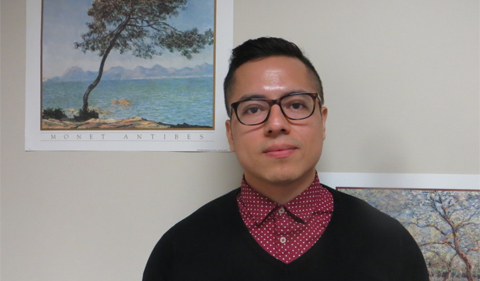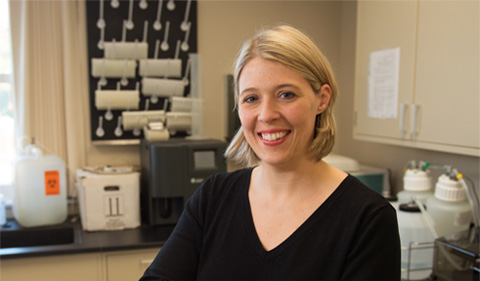By Juliana Scheiderer ’16
Can discrimination have an effect on physical health?
Wilson Figueroa, a graduate student in health psychology, thinks so. Through his research in the Psychology Department’s stress lab, Figueroa is tracking associations between discrimination and self-reports of poor health in the LGBT community. His adviser is Dr. Peggy Zoccola.
“I was originally just interested in stress and health, but then I read a paper by the American Institute of Medicine about health disparities in sexual minorities and all the lack of research associated with that,” he explained. “I thought ‘This really is an area that we need to do more research in.’”
Examining Minority Stress
Figueroa specifically examines an area of psychology known as minority stress, or stressors affecting minority groups. His specific subcategory is sexual minority stress. Figeuroa said that there are significant disparities in the health of sexual minorities.
“You see greater rates of depression, anxiety, and suicide, but behaviorally you see increased risky sexual behavior, increased tobacco use, increased drug use, and all of these things are going to lead to poor health over time,” he explained.
“So what we’re really trying to do is map these minority stressors to these risky health behaviors,” Figueroa continued. “Is discrimination leading to more risky sexual behavior? Is discrimination leading to more tobacco use? And over time, is this going to lead toward more negative health outcomes?”
Figueroa also has found that discrimination from those close to you has a greater impact on health.
“What I found is that discrimination from family and friends, above discrimination from people you don’t know, or discrimination from health workers, was associated with the greatest increase in self-reports of poor mental and poor physical health,” he said. “Not all types of discrimination are the same.”
Figueroa and his team track stressors by looking at a hormone called cortisol.
“We’re looking at LGBT people over the span of a week and seeing what stressors they self-report over the week and then comparing that to the stress hormone, cortisol,” he said. “So we want to see: Is minority stress, above and beyond general stress, like daily hassles, associated with dysregulation of cortisol? If it is, that is going to explain a lot of the health disparities of LGBT people.”
Building Resiliency
“On top of that, I’m interested in resiliency factors. A lot of people focus on what’s called ‘risk factors,’ or what’s causing the illness. I’m interested in resiliency factors, too, or what’s preventing illness,” Figueroa continued. “The main resiliency factor I’m interested in is psychological hardiness.”
Figueroa explained that psychological hardiness can be a framework for how individuals see a stressor. Instead of seeing a stressor as something to fear, hardier individuals may see it as a challenge. He then applied this concept to the results he saw within the LGBT community.
“My main goal is for interventions,” Figueroa said. “I think there’s very little in the way of interventions for LGBT people.”
One of the reasons for this is disclosure. According to Figueroa, many members of the LGBT community don’t want to come out in research settings where they may feel exposed. Figueroa combats this issue with completely online remote studies.
More specifically, Figueroa hopes to develop what he calls “hardiness training.” As psychological hardiness is related to lower cortisol and lower stress, hardiness training, or teaching people how to be more psychologically hardy could be beneficial.
“The goal really is intervention,” he says. “Seeing how we can stop the association between minority stress and poor health.”
A Background in Health and Wellness
Figueora began his academic career as a pre-med major at the University of California-Irvine, where he decided he was more interested in health psychology and the connection between physical and mental health.
“Health psychology looks at the intersection of mind and body, and that’s what I’m really interested in,” he said. “That’s where I get the most out of research and helping people is with this mind body connection.”
Now, as a sixth-year doctoral student, Figueroa teaches classes surrounding his area of expertise, including statistics, psychology of health and illness, and physiological psychology.
“I think as graduate students it’s important that we get that experience,” Figueroa said of teaching. “It’s very different being trained to be a researcher and then having to go out there and present what you learned and teach people in the field of psychology.”
When asked what brought him to OHIO, Figueroa doesn’t hesitate.
“The facility,” he said. “There’s very few experimental health psychology programs in the United States. This is one of the few.”
“They really have a good program in regards to the physical health side; I’m learning how to do a lot things where I could start my own lab once I graduate,” he continued. “OHIO has a lot to offer as far as health psychology goes, that other programs don’t.”
With regard to the program’s small size, Figueroa sees it as a benefit.
“The health psychology section here is small, but I think that’s a good thing.” he said. “We do collaborate a lot, and the program’s size makes it easier to talk to other people in the section.”
Reaching Out to the Community
Figueroa also emphasizes the need for funding and public support.
“I want people to know the importance of this research, and that it is really hard to do. I’d like to stress the importance of doing research and funding research. There’s a need for research,” he said.
“Our research is aimed at informing the public, it’s not just for us as scientists. We’re trying to get information out to people. But if we can’t fund it, we can’t do it. It’s not just for other psychologists or people reading about our work, we want to reach out to the community if we can.”




















Comments